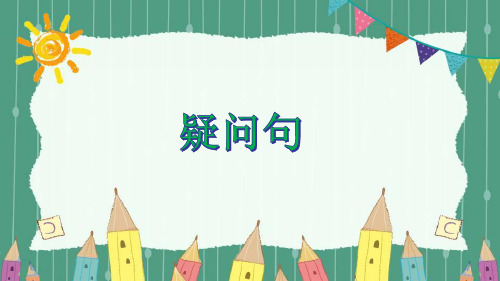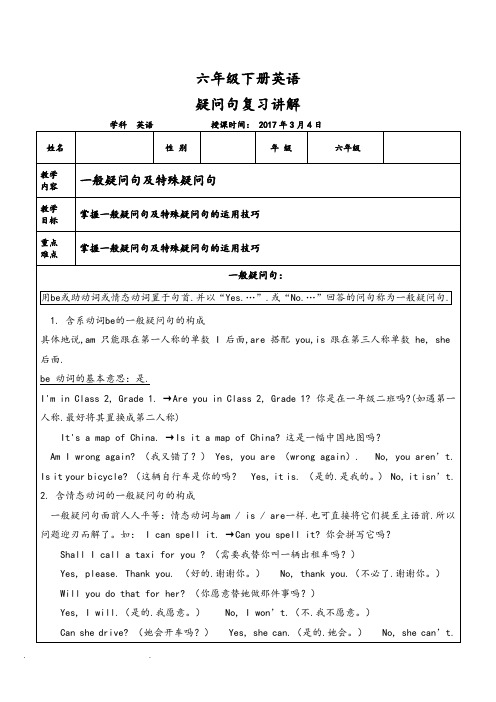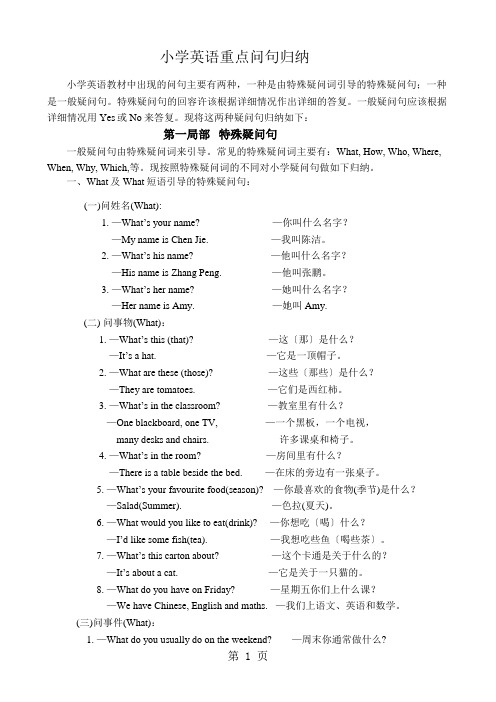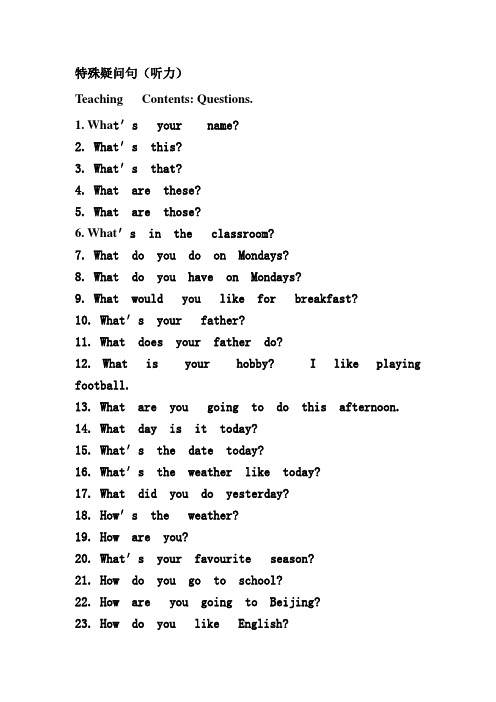六年级英语毕业复习--一般疑问句及特殊疑问句
湘少版 六年级英语下册毕业总复习疑问句

7.Are there any pandas in the mountains? 山里有一些熊猫吗? Are there any fish in the rivers? 河里有一些鱼吗? Yes, there are. 是的,那里有。/ No,there aren't. 不,那里没有。
14.对具体次数提问,如:once,twice,three times,应用how many times 例:How many times did he call you the day before yesterday?It's about two kilometres from here. —How far is it from here?
例:The twins are making a kite. —What are the twins doing? Mrs Turner asks her son to buy some eggs. —What does Mrs Turner ask her son to buy?
2. 对名词前的定语提出疑问,疑问词应用which,并且和名词连用
一般疑问句
一般疑问句:表示疑问,一般回答只有两种可能Yes或No, 一般疑问句中没有疑问词。
如何将一个肯定陈述句改为否定句: 1.看句中有无be动词,如有,把be动词提到句首即可。 2.看句中有无情态动词,如有,把情态动词提到句首即可。
3.如上述二者都没有,就应把助动词提到句首。分四个步骤: (1) 肯定陈述句中本来是没有助动词的,要加上去,位置在 主语(某人或某物)后,动词前。 (2) 确定助动词用do、does还是did,根据句中动词来判断, 动词是原形,助动词就用do;动词是第三人称单数,助动词 就用does;动词是过去式,助动词就用did。 (3) 将助动词提到句首。 (4) 将原句中动词恢复原形。 注:句中有some时,要考虑是否要改为any。
六年级下册英语素材一般疑问句与特殊疑问句的区别 全国通用

英语语法中的一般疑问句和特殊疑问句的区别一、1.一般疑问句定义:能用yes / no回答的问句。
2. 含助动词be的一般疑问句的构成具体地说,就是当陈述句中有am /is / are时,可直接将它们提至主语前,但如遇第一人称,最好将其置换成第二人称。
如:I'm in Class 1, Grade 4. →Are you in Class 2, Gr ade 1? 你是在一年级二班吗?It's a map of Chi na. →Is it a map of China? 这是一幅中国地图吗?3. 含情态动词Can的一般疑问句的构成Can可直接将它们提至主语前。
如:I can do it. →Ca n you do it? 你会做吗?4. 含实义动词的一般疑问句的构成含实义动词的一般疑问句,要在句首加do;如果主语为第三人称单数,要在句首加does,并要将动词变回原形(如has→have,like s→like等);有时陈述句中的some还要变作any等。
如:She lives in Beijing. →Does she live in Beijing?她住在北京吗?I like English. →Do you l ike English? 你喜欢英语吗?二、一般疑问句的应答用yes / no回答如:①-Is Daming a Chinese boy? 大明是中国男孩吗?-Yes, he is. / No, he isn't. 是的,他是。
/不,他不是。
②-Can Daming speak Chinese? 莉莉会说中国话吗?-No, he can't. / Sorry, I don't know. 不,她不会。
/对不起,我不知道。
“师”之概念,大体是从先秦时期的“师长、师傅、先生”而来。
其中“师傅”更早则意指春秋时国君的老师。
《说文解字》中有注曰:“师教人以道者之称也”。
六年级英语毕业复习一般疑问句和特殊疑问句

六年级下册英语疑问句复习讲解eg. Liping,they,his fatherHe is my father. ______ is he?4)对物主代词和名词所有格提问用whose。
eg. Li Ping's coat→Whose coatmy father→Whose father5)对具体时间提出疑问.如 in the morning,last Sunday等.疑问词用when;对具体几点钟提问.疑问词应用what time。
It’s two o’clock now. _____ _____ is it now?6)对具体地点提出疑问.疑问词应用where。
The pupils are having a picnic at the foot of the hill. (划线提问)_____ _____ the pupils having a picnic?7)对表原因的从句提问.常见的有because引导的从句.疑问词应用why。
Xiao Cheng didn't go to the farm with us because he was ill. (划线提问)_______ _____ Xiao Cheng go to the farm with us?8)对方式或程度等提出疑问.用疑问词How。
eg. go by bike, like very much9)对数量提出疑问.疑问词为How many.要注意how many必须跟名词的复数形式。
two hundred sheep→How many sheep10)对价格提出疑问.疑问词用How much。
I paid fifty yuan for the sweater.______ ______ did you pay for the sweater?11)对时间长度提出疑问.疑问词应用How long。
I've worked in that factory for two years. (划线提问)96中考题______ _____ _______ you worked in that factory?12)对时间频率.如 once a year, twice a week等提问.疑问词用How often。
小学英语特殊疑问句和一般疑问句地归纳

特殊疑问句和一般疑问句的答法一般疑问句通常都是 1..以be (am,is,are,)开头2.以Do,Does,Did 开头或以Can开头回答方法:前面用什么提问的就用什么答。
只有两种回答方式:1)肯定的, Yes,主语 + 提问词.2)否定的 No,主语+提问词+not.【注意:问句与答句的第一二人称要互换】如:④主语是名字时的答语:看性别,男的用he ,女的用she ,其他的用it 复数就用they。
如:①Is she……? Is he………? Is it……..?Yes, she is. Yes, he is. Yes, it is.No, she isn,t. No, he isn,t. No, it isn,t.②Are they………? Are the monkeys …….?Yes, they are. Yes, they are.No,they aren’t No,they aren’t③ Do they………? Does he……..? Did she…….?Yes,they do. Yes,he does. Yes, she did.No,they don’t. No,he doesn’t. No,she didn’t.④Are you……..? Are you……..? Do you…….?Yes, I am. Yes, we are. Yes ,I do. 或 Yes,No, I am not. No, we aren’t. No,I don’t. 或No,⑤Does Mike…….? Is ChenJi…..? Do your parents…?Yes ,he does. Yes , she is. Yes, they do.No,he doesn’t. No, she isn’t. No,they don’t.一、专项练习。
1. Did ChenJie read books yesterday?2. Can the girl cook the meals ?—————————————————————————————3.Is he going to swim this afternoon?4. Are they going to take a trip next weend? ————————————————————————————————5.Does he often go to school by bike ? 6. Do you play basketball every weekend? ———————————————————————————————————7. Did Mike do his homework yesterday? 8. Are they playing basketball now?————————————————————————————————一般疑问句及特殊疑问句的总结一般疑问句的定义:用yes或no来回答的疑问句叫一般疑问句。
六年级下册英语素材小学英语重点疑问句归纳 全国通用

小学英语重点问句归纳小学英语教材中出现的问句主要有两种,一种是由特殊疑问词引导的特殊疑问句;一种是一般疑问句。
特殊疑问句的回容许该根据详细情况作出详细的答复。
一般疑问句应该根据详细情况用Yes或No来答复。
现将这两种疑问句归纳如下:第一局部特殊疑问句一般疑问句由特殊疑问词来引导。
常见的特殊疑问词主要有:What, How, Who, Where, When, Why, Which,等。
现按照特殊疑问词的不同对小学疑问句做如下归纳。
一、What及What短语引导的特殊疑问句:(一)问姓名(What):1. —What’s your name? —你叫什么名字?—My name is Chen Jie. —我叫陈洁。
2. —What’s his name? —他叫什么名字?—His name is Zhang Peng. —他叫张鹏。
3. —What’s her name? —她叫什么名字?—Her name is Amy. —她叫Amy.(二) 问事物(What):1. —What’s this (that)? —这〔那〕是什么?—It’s a hat. —它是一顶帽子。
2. —What are these (those)? —这些〔那些〕是什么?—They are tomatoes. —它们是西红柿。
3. —What’s in the classroom? —教室里有什么?—One blackboard, one TV, —一个黑板,一个电视, many desks and chairs. 许多课桌和椅子。
4. —What’s in the room? —房间里有什么?—There is a table beside the bed. —在床的旁边有一张桌子。
5. —What’s your favourite food(season)? —你最喜欢的食物(季节)是什么?—Salad(Summer). —色拉(夏天)。
六年级下册英语特殊疑问句及一般疑问句汇总复习

特殊疑问句(听力)Teaching Contents: Questions.1. Wha t′s your name?2. What′s this?3. What′s that?4. What are these?5. What are those?6. What′s in the classroom?7. What do you do on Mondays?8. What do you have on Mondays?9. What would you like for breakfast?10. What′s your father?11. What does your father do?12. What is your hobby? I like playing football.13. What are you going to do this afternoon.14. What day is it today?15. What′s the date today?16. What′s the weather like today?17. What did you do yesterday?18. How′s the weather?19. How are you?20. What′s your favourite season?21. How do you go to school?22. How are you going to Beijing?23. How do you like English?24. When is your birthday?25. When do you usually get up?26. When did you go to shanghai?27. Where are you from?28. Where are you going to go?29. Where is your pencil?30. Where are your shoes?31. Where did you go last Sunday?32. Which season do you like best?33. Which sweater is yours?34. Who′s that man?35. Who are they?36. Who are you going to go with?37. Whose T-shint is this?38. How many pencils do you have?39. How many cats can you see?40. How many students are there in the chassroom?41. How many seasons are there in a year?42. How much is the dress?43. How much are the shoes?44. What happened to you?45. What′s the matter?46. What′s wrong with you?47. What colour is the schoolbag?48. What class are you in?Lesson TwoContents:一般疑问句1. Are you John?2. Are you from America?3. Are you tall?4. Are you watching TV?5. Are you going to play football tomorrow?6. Is this a book?7. Is that a panda?8. Is the man your father?9. Is this girl your sister?10. Is it black?11. Is the sweater green?12. Am I a teacher?13. Do you like apples?14. Do you go to school by bike?15. Do they often play football on Sundays?16. Does your father go to work by car?17. Does your sister usually get up at six o′clock?18. Would you like some juice? Yes, please? 19. Would you like some fish? No, thank you.20. Can you play the piano?Yes, I can. / No, I can′t.21. Will you22. Did you eat fruits yesterday?Yes. I did. No, I didn′t.。
小学英语语法---一般疑问句和特殊疑问句

就划线部分提问:(变特殊疑问句) This is a book. 第一步:变一般疑问句 Is this a book? 第二步:找合适的特殊疑问词 Is this what ? 第三步:特殊疑问词提前放到句首,并大写, 其余按顺序照抄,省略划线部分。 What is this?
变否定句的做法:
1、如句子里是be动词:am,is,are,was,were 就在这些词后加 not 例句:He is Tom. He is not Tom. 2、如句子里是动词就在这些词前加 don't,doesn't,didn't (1)主语是第一、二人称(复数)加don‘t,第三人称单数加 doesn't (2)如果是过去式就加didn't 例句:I like dogs. I don‘t like dogs. 3、如句子里是情态动词是must,can,may,should 就在这些词后 加not 例句:You can watch TV now. You can not watch TV now.
小学英语语法知识(一般疑问句)
一般疑问句:
表示疑问,一般回答只有两种可能Yes,……或 No,……句中没有疑问词。
如何将一个肯定的陈述句改为否定句: 1、看句中有无be动词,如有,把be动词提到句首即 可。
2、看句中有无情态动词,如有,把情态动词提到句首 即可。
3、如上述二者都没有,就应把助动提到句首。分四 个步骤: (1)肯定陈述句中本来是没有助动词的,要加上去, 位置在主语(某人或某物)后,动词前。 (2)确定助动词用do、does还是did,根据句中动 词,动词是原形的助动词就用do,动词是第三人称 单数的助动词就用does,动词用过去式的助动词就 有did。 (3)把助动词后提到句首。 (4)原句中动词假如发生变化就要恢复成原形。 强调一点,有some的要考虑是否要用any。
一般疑问句和特殊疑问句(讲义)通用版英语六年级下册

一般疑问句和特殊疑问句一般疑问句(1)概念:可以用Yes或者No来回答的疑问句是一般疑问句。
一般疑问句读的时候往往要用升调;译成汉语的时候常可以译为“......吗?”(2)结构:1、be动词+主语+其他肯定回答:Yes, ...am/ is /are.否定回答:No, ...am not./ isn’t / aren’t.例句1:Is this your English book?肯定回答: Yes,it is. / 否定回答: No,it isn't.例句2: Are these your English books?肯定回答: Yes,they are. / 否定回答: No,they aren't.2、情态动词+ 主语+ 动词原形+ 其它部分?肯定回答:Yes, ...can.否定回答:No, ...can’t.例句1:Can you speak English?肯定回答:Yes, I can. 否定回答:No, I can’t.例句2:Can he swim?肯定回答:Yes, he can. 否定回答:No, he can’t.3、助动词Do/Does+ 主语+动词原形+其他部分?肯定回答:Yes,...do/ does.否定回答:No, ...don’t/ doesn’t.例句1:Do you like flowers?肯定回答:Yes, I do. / 否定回答:No, I don’t.例句2:Does he like flowers?肯定回答:Yes, he does. / 否定回答:No, he doesn’t.(3)如何将陈述句变成一般疑问句?1、陈述句中有be动词(am, is , are等)或情态动词(can,must等)时,变成一般疑问句要将be动词和情态动词提到句首,句末加上问号即可,如果是第一人称,则要变成第二人称。
例如:She is a clever girl. → Is she a clever girl?I can swim. → Can you swim?2、句子里面含有实义动词(如like, likes, have,has, run, swim, jump等)。
- 1、下载文档前请自行甄别文档内容的完整性,平台不提供额外的编辑、内容补充、找答案等附加服务。
- 2、"仅部分预览"的文档,不可在线预览部分如存在完整性等问题,可反馈申请退款(可完整预览的文档不适用该条件!)。
- 3、如文档侵犯您的权益,请联系客服反馈,我们会尽快为您处理(人工客服工作时间:9:00-18:30)。
六年级下册英语疑问句复习讲解
13. Did they watch TV yesterday? (作出肯定回答)
14.Is the tiger sleeping? (作出否定回答)——————————————————————
15. Are the lions fighting? (作出否定回答)
16. Is it drinking water? (作出否定回答)
17. Are they climbing trees? (作出否定回答)———————————————————————
18. Is Chen Jie doing an experiment? (作出肯定回答)———————————————————————
19. Is Zhang Peng taking pictures? (作出肯定回答)
20.Were you happy yesterday ,Zhang Peng and Liu Yun? (作出否定回答)———————————————————————
21.Were you excited yesterday? (作出否定回答)———————————————————————
二、根据答句写问句。
1. __________________________________________________?
Yes, I often go shopping on Sundays.
2. __________________________________________________?
No, I don’t go to school on Saturdays.
3. __________________________________________________?
Yes, I get up at 6:50.
4. __________________________________________________?
Yes, I like going hiking.
5. ___________________________________________________?
Yes, I like spring best.
6. ___________________________________________________?
No, my favourite season isn’t winter.
7. __________________________________________________?
Yes, I made a snowman last winter.
1________________________________? 1 2
I usually get up at 6:50 in the morning.
2________________________________?
Ann does morning exercises at 9:10 every day.
3________________________________? 3 4
I often play the piano after school.
4________________________________?
Yes, I often visit my grandparents on Saturday.
5________________________________?
No, she doesn’t. She usually climbs mountains on Sunday.
6________________________________? 5 6
I like winter best.
7________________________________?
I can make a snowman in winter. 7 8
8________________________________?
Because I like swimming in the sea.
9________________________________? 9 10 It’s sunny and hot in summer.
10________________________________?
Because I can skate in winter.
11________________________________? 11 12
2月
I wear T-shirt today.
12________________________________?
My birthday is in February.
13________________________________? 13 星期三14 5月18日Today is Wednesday.
14________________________________?
Today is May 18th.
15________________________________? 15 4月16 No, my birthday is in May.
16________________________________?
Mike has a birthday in November. 17 10月18 17________________________________?
Yes, my birthday is in October.
18________________________________?
Mike likes summer best. 19 20 19________________________________?
I am making the bed.
20________________________________?
Yes, I can cook the meals. 21 22 21________________________________?
My aunt is answering the phone.
22________________________________?
Yes, the tiger is writing an e-mail in the study.
23________________________________? 23 24 No, my grandpa is reading newspapers.
24________________________________?
The tiger is running.
25________________________________?
The elephants are drinking water by the river.
26________________________________?
The students are in the woods.
27________________________________?
No, they aren’t. They are picking up leaves.
28________________________________?。
